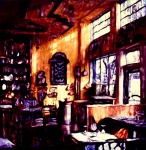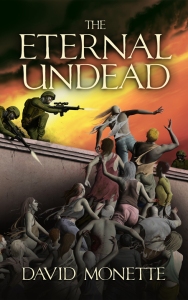Authors, Writers, Publishers, and Book Readers
 This morning I'm up early to pick up this week's featured author. Into the transporter and he sets the controls, and soon we're sitting in a lovely French cafe that's just opened. A few other cafes along the boulevard will be opening soon. Next door a young waitress sprays the sidewalk, causing rainbows in the air. A few minutes later i'm enjoying hot tea (sorry, no coffee for me) and I'm ready to talk writing and books.
This morning I'm up early to pick up this week's featured author. Into the transporter and he sets the controls, and soon we're sitting in a lovely French cafe that's just opened. A few other cafes along the boulevard will be opening soon. Next door a young waitress sprays the sidewalk, causing rainbows in the air. A few minutes later i'm enjoying hot tea (sorry, no coffee for me) and I'm ready to talk writing and books.
1. Who are you and what makes you the most fascinating person in your city?
For starters, to say that I’m the most fascinating person in this city is quite a stretch. That being said, the reason for us to sit and chat is that I’m an author and an illustrator and I’ve just released a new book called The Eternal Undead. It’s the third and final book of the In the Time of the Dead Trilogy, published by Severed Press. So that’s pretty exciting.
2. Without revealing a deep dark secret (unless you want to), what one thing would people be surprised to learn about you?
Let’s see… people might be surprised to learn that I was, and am, an illustrator and that I’m the artist who did the covers and interior work for the books.
3. What interested you to become a writer rather than something else such as rock star?
Actually, writing wasn’t my first choice. As I said, I started out as an illustrator, doing science fiction and fantasy projects for different publishers. While I was studying for my MFA in illustration a few years back, I had a professor tell me that I was a very talented writer and that I should pair my writing skills with my illustrative talent. I listened to his advice, and here I am.
4. Writers are readers. With which author(s) would you enjoy sharing dinner? Why?
If he were still alive, I’d like to sit with Hemingway and have dinner somewhere in the Serengeti, or maybe, since I’m already imagining, in Paris during the 1920’s. That way, maybe during dinner, Picasso and Joyce would stop by, or maybe even Gertrude Stein and Ezra Pound. I only have to get past that tricky time traveling stuff… Why these folks, though? Well, I’m researching the 1920’s for my next book, and this time period is stuck on my mind, playing across the insides of my eyes on a loop.
 5. If I were stranded on a deserted island or suffering from a four hour layover at the airport, why would your book(s) be great company?
5. If I were stranded on a deserted island or suffering from a four hour layover at the airport, why would your book(s) be great company?
Let’s examine this question from both angles as realistically as possible. If you were stranded on a desert island with my book, it would be great company because once you were done reading it you could find many other useful things to do with it. For one, if you really had to, you could use its pages as fuel for starting a fire. You could also use it to take care of any toiletry needs that would occur. Now, don’t get me wrong, both of the latter ideas are completely horrifying to me in reference to a book that I spent a ridiculous amount of time and energy to create. But, realistically, yeah, go ahead, do what you gotta do. You’re on a desert island for Pete’s sake.
As far as an airport, that one is easier. I mean, you would basically just read the thing and be vastly entertained and impressed by my skills as a writer. Your flight, when it did occur, would go by in a flash because you would be ruminating on the wonderful wordplay you found in its pages. When you got home, you would then order copies for all of your friends and relatives in a fit of passion before collapsing on your couch to read my book three more times.
6. Share your process of writing in regards to: plot and character development, story outline, research (do you Google or visit places/people, or make it up on the spot), writing schedule, editing and number of rewrites.
My writing process. I generally have an idea, sort it out either on paper with an outline or in my head as a rough plan of attack. Then I start writing. Along the way, I research what needs researching. This could be anything from how a coffee percolator works to what life is like on an aircraft carrier. I Google places and people as part of that research, but when it comes to places, I don’t like to write about a place unless I’ve been there; I like to have the background impressions of an area floating in the gray of my brain somewhere. As far as a writing schedule, I write during the day or sometimes at night. It really doesn’t matter. When it comes to editing or rewriting, I pretty much do that while I write. I’ll go back and re-read a chapter a few times before I move on to the next. If I feel insecure, I’ll start at the beginning of the book and read the whole thing just so I can be confident of its direction and flow.
7. “I think I have a good idea for a story, but I don't know where or how to begin. Your process may not work for me. Any advice?”
My advice would be; “Don’t write it.” That sounds harsh, I know, but my theory is: if you don’t know where or how to begin telling a story then you aren’t ready to be a writer. You need to read more and write more. How much more? I don’t know—as long as it takes for you to know where or how to begin telling a story.
8. I saw an amusing T-shirt the other day which read, “Every great idea I have gets me in trouble.” What is your philosophy of life?
I don’t know if I have a philosophy of life that would fit on the front or back of a T-shirt. Maybe that’s why I write, to try to figure out stuff about this odd thing we call existence.
9. Please tell me you're not going to stop writing? What's next for you?
I’m not going to stop writing. Right now I’m working on a historical fantasy novel that takes place in 1920’s America, the Prohibition Era. It is a ton of research, but very fun.
10. Where can people find more information on you and your projects?
I’ve got all the online stuff. I’ve got a blog, Facebook page, Twitter, website, Instagram. Thanks for having me on your blog! The location for this interview is amazing!
Comment
© 2025 Created by Authors.com.
Powered by
![]()


You need to be a member of Authors.com to add comments!
Join Authors.com